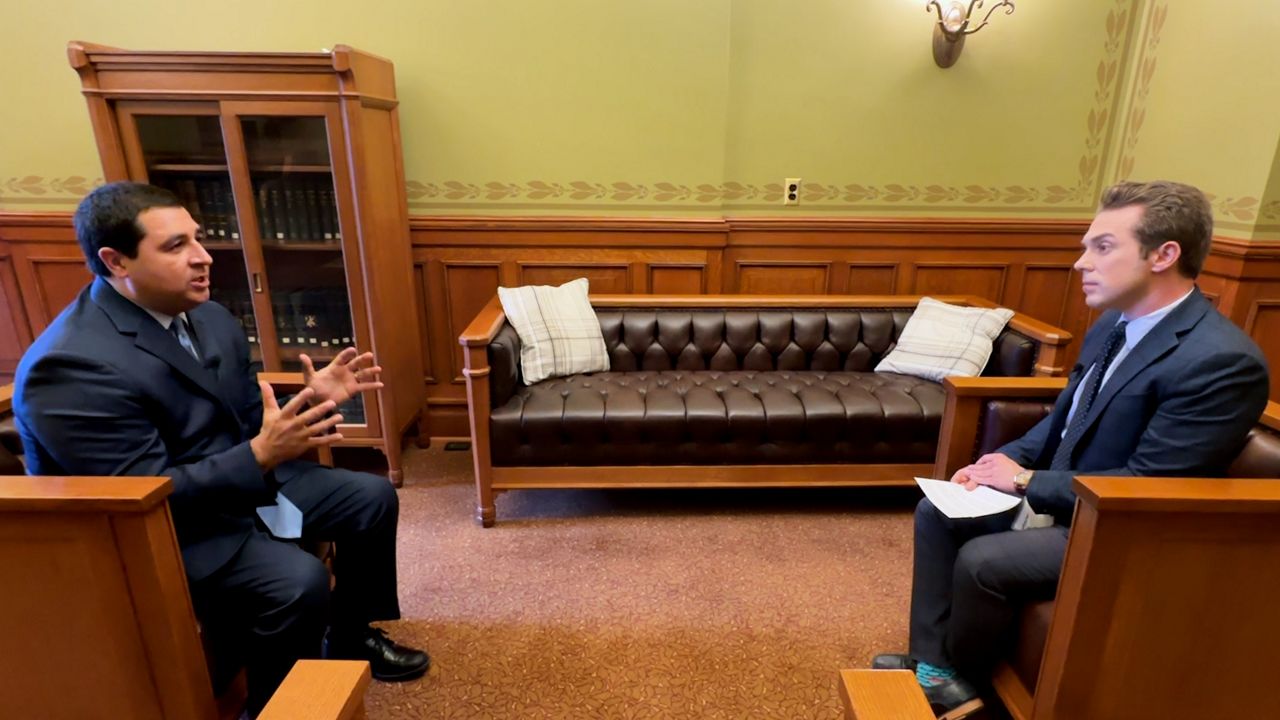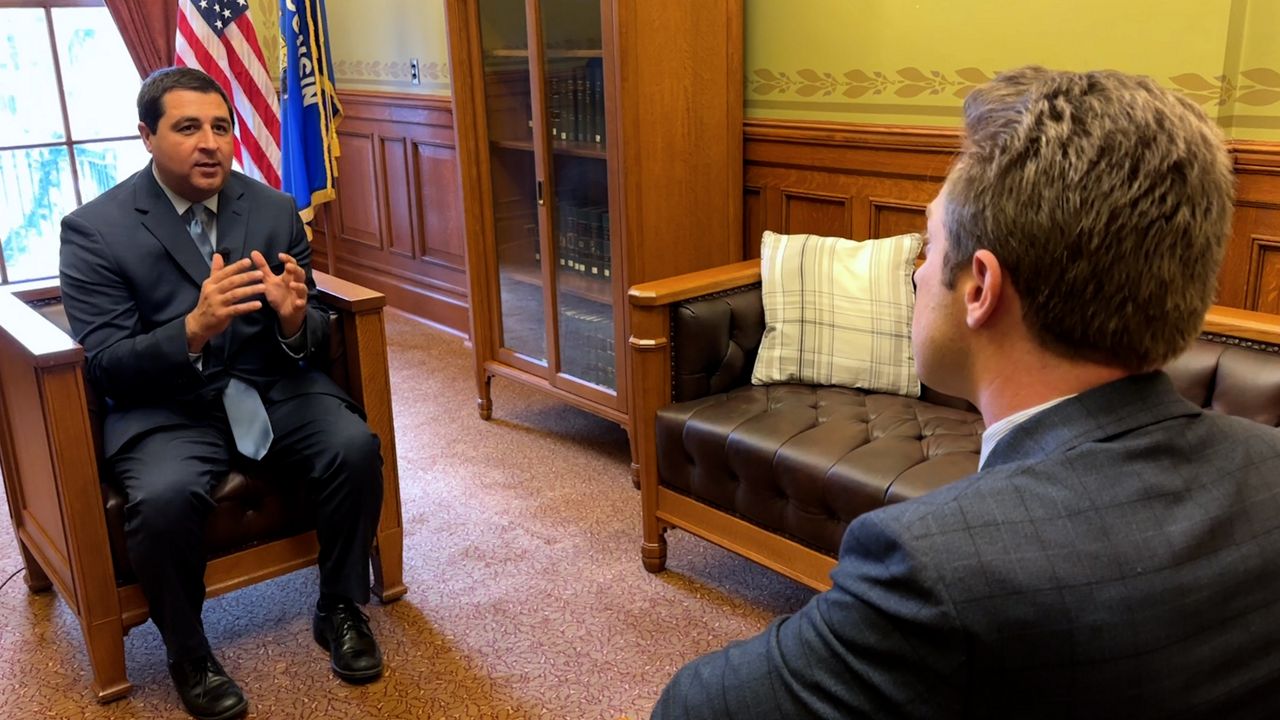MADISON, Wis. — In November, voters gave Wisconsin Attorney General Josh Kaul another four-year term as the state's top cop.
Kaul, a Democrat, recently sat down one-on-one with Spectrum News 1 Political Reporter Anthony DaBruzzi to discuss his priorities for the upcoming year as he leads the Wisconsin Dept. of Justice and offers his budget request to lawmakers for their consideration.
Wisconsin's race for attorney general between Kaul and his Republican challenger Eric Toney was defined by several hot button issues ranging from crime and abortion rights to election integrity.
With campaign season now in the rearview mirror, Kaul said his top priority always was, and still is, public safety.
“Right now, we have seen levels of violence in communities around the country, really, in the wake of the pandemic that are just not acceptable, and we need to work to reduce that violence,” Kaul explained. “We also need to address the opioid epidemic and the harms that it has caused, especially with the rise of fentanyl and the overdose deaths that we have seen in connection with that.”
About a year ago, Kaul proposed what he calls the 'Safer Wisconsin' plan, which would invest $115 million toward public safety efforts across the state. Part of the funding would go toward officer recruitment, retention and wellness.

“It would also include funding for community policing for victim services and for violence prevention," Kaul said. "Getting resources to our local law enforcement agencies and other people who are working to make communities safer is what we need to be doing right now."
Earlier this year, Kaul filed a lawsuit on behalf of the Evers administration to block the enforcement of Wisconsin's abortion ban from 1849, which took effect after the U.S. Supreme Court overturned the landmark Roe v. Wade case.
Compromise could be on the table as Republican leaders have signaled they would be willing to consider exceptions to the 173-year-old law for rape and incest. However, Gov. Tony Evers seems unwilling to accept the narrow options offered, which Kaul referred to as “not serious compromises.”
“What our suit is arguing is that the 1849 ban, which criminalizes abortion in almost all cases, should be blocked from enforcement because more recently passed laws are fundamentally inconsistent with that,” Kaul said. “What I'd like to see the legislature do is repeal that 1849 ban. We should not be a state that has a nearly total ban on abortion in place, and that's not what voters in Wisconsin want. You know, one of the key issues in the election we just had was access to safe and legal abortion, and the governor and I were very clear about where we stood on that issue, and the voters reelected us.”
As a result of a settlement with opioid manufactures, the state's Dept. of Justice has secured more than $400 million for Wisconsin.
State law requires 30% of those funds to go to the Dept. of Health Services (DHS), with the remaining 70% distributed to county and local governments across Wisconsin.
“What I think is vital is that those county and local governments and DHS work collaboratively to make sure that those dollars are being spent as efficiently as possible,” Kaul said. “We certainly have a shortage in treatment resources, so expanding access to treatment for substance use disorder is a really important step that we can take. Also, investing in recovery programs and prevention programs, and then investing in enforcement efforts is critical as well.”
A looming strike by UW nurses was avoided in September thanks, in part, to an agreement between the nurses and the hospital mediated by Gov. Evers. The deal merely established a pathway for the hospital to first determine if it is forced to recognize a union and, secondly, whether it can legally voluntarily recognize a union.
An opinion released over the summer from Kaul's Dept. of Justice believes the hospital can voluntarily engage in collective bargaining with the nurses, which has been heavily cited by those in favor of a union.

“We issued an opinion that throughly analyzed the issues, and while there has been an administrative opinion issued, it sounds like from press reports there is going to be a lot more litigation over these topics,” Kaul explained. “We look at AG opinions through the lens of what is the best reading of the law, and that is what we did here, and we issued a lengthy opinion that goes into depth as to why we believe that voluntary recognition is what the law allows for.”
Kaul acknowledged that ultimately the courts will weigh in, and there is no certainty to how they may rule on the matter.
When a new legislative session begins in January, state lawmakers will need to begin the process of passing a spending plan as they do every two years. However, this biennium will be different as Wisconsin has a projected $6.6 billion surplus.
Kaul said he wants Wisconsinites to understand two things about those circumstances: lawmakers have the opportunity to make one-time or long-term investments in critical services, and investments in public safety are more important now with unprecedented opioid-related deaths and violence.
“That can include investing more in shared revenue, so there are more dollars that go from the state to local government to fund services like local law enforcement, but it can also include investments in treatment programs and diversion programs and community policing, so that we are providing resources to the kinds of services that we know can make our communities safer,” Kaul explained.



